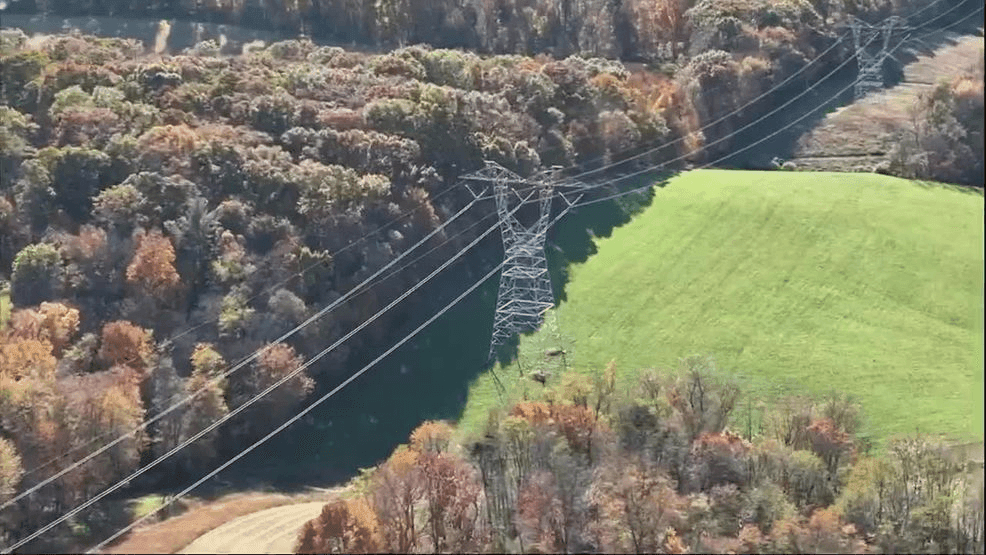(WBFF) — In a Town Hall discussion on the controversial Maryland Piedmont Reliability Project (MPRP), lawmakers, energy experts, and policy makers spoke about the various issues posed by the proposed transmission line as well as Maryland’s energy-generating capabilities.
The MPRP’s need and development was central to the hour-long discussion hosted by FOX45’s Mikenzie Frost. Frederick Hoover, chair of Maryland’s Public Service Commission (PSC), said that while he couldn’t comment on specifics of their proposals, groups behind the project still need to convince members of the PSC, himself, and the general public of its necessity.
“While the company is contending that this project is needed for that, they have the burden of proof to convince the Public Service Commission that that’s true,” he said. “I can’t really comment on the validity of their arguments.”
ALSO READ | “I hope the Public Service Commission can help:” Residents speak out in transmission fight
The MPRP – proposed as a solution to a burgeoning energy crisis, according to PSEG, the company behind it – has drawn criticism from residents and lawmakers alike for allegedly not providing power to Maryland despite being built through the state as well as failing to consider routes that use primarily undeveloped land, as opposed to the currently proposed route that builds a sizable portion of the transmission line on occupied land.
To that point, State Sen. Chris West echoed a common concern of the majority of panelists, arguing that the “project provides absolutely no benefit to the state of Maryland.”
“It is a long extension cord that goes from the Pennsylvania line down to Point of Rocks,” Sen. West said. “What there is is a transmission line there that takes it directly to Loudoun County, Virginia. Every single electron coming through this proposed line is going down to Virginia. It’s not going to be used in Maryland.“
West said he plans to introduce legislation during the upcoming General Assembly to get a better understanding of Maryland’s energy problem.
“Maryland needs a single energy policy with everyone on the same page,” he said, as contrasted with what he currently sees as a multitude of ideas across the aisle. West pushed for “a top-level task force for 2025” studying Maryland’s current energy situation and projections for years down the road if different plans are followed.
Senate Minority Leader Steve Hershey was more pointed with his ideas and laid blame to Democrats in Annapolis who control both chambers of the General Assembly.
“There’s a capacity and generation issue, and this is a bad position we’re in because of Democrat policies,” he said.
Hershey also claimed Maryland imports 40% of its energy from other states, and thus is “reliant on other states to be able to provide us enough generation, but in order to do so, that has to come through transmission lines.”
Governor Wes Moore’s name was invoked multiple times throughout the discussion. From a disclaimer that the governor declined an invitation to participate to criticisms of his handling of the MPRP proposal, Moore’s leadership was brought into question.
“He’s completely absent, and without that leadership, we’re going to have a hard time getting a good plan together to tackle these bigger, long-term issues in the future,” State Del. Ryan Nawrocki said.
While several of the Town Hall’s guests focused on the big picture, Mark Aitken, Senior Vice President of Advanced Technology for Sinclair Broadcast Group, said the time is now to look at the future of energy needs in Maryland.
“Our energy demands are now, we need to take advantage of what we have now, but we also need to plan for the future,” he said.
Hoover pointed out that while PJM has a proposed 2027 end date for the building of the transmission line, that is in no way feasible in his eyes, despite predictions from the managing company behind the regional power grid that Maryland’s electrical grid may experience widespread issues that same year if problems aren’t addressed.
Joanne Frederick, head of the “Stop MPRP” group, was blunt in her assessment. “The bottom line is this project is unacceptable. There is no amount of explanation that makes it acceptable to take 70 miles of preserved land, farms, et cetera,” she said.
PSC will review the project application and determine if it will move forward. There will be public hearings scheduled in the counties impacted by the proposed route. The schedule for those hearings have yet to be determined.
